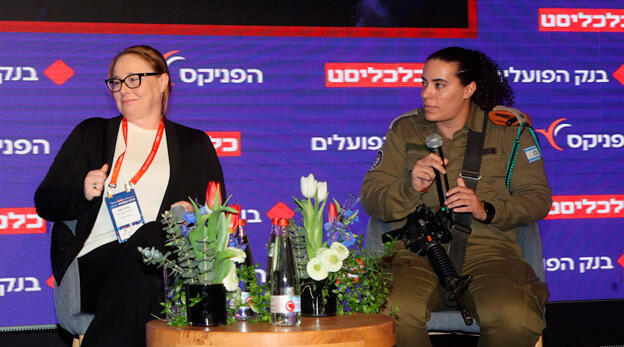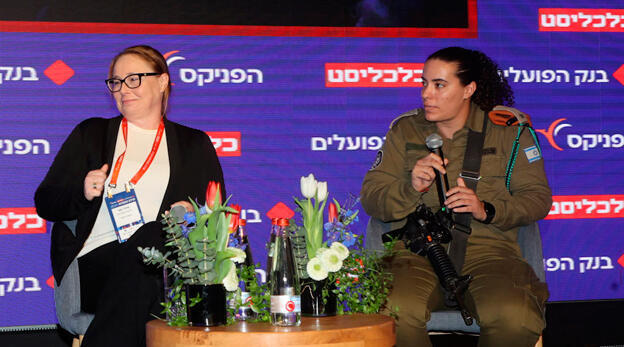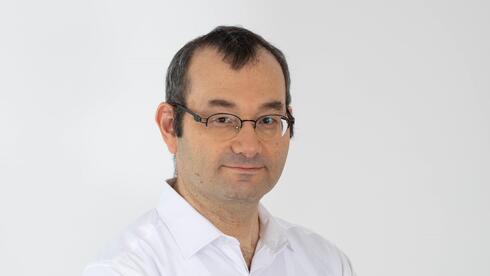
Front & center: Israeli women at forefront of Gaza war both in the field and in innovation
IDF Major Sapir Barki shared her personal experiences fighting at the Zikim outpost on October 7. Michal Mor, CEO of Smart Shooter, which develops smart fire control systems, added, "If people may have once thought it was necessary to invest only in fighter planes, we learned that wars are not won only from the air"
Women are serving on the front lines of the war against Hamas in Gaza and they are the best answer to anyone who has doubted, wondered or raised concerns about their abilities on the battlefield. Major Sapir Barki, company commander for Search and Rescue from the Home Front Command who fought and protected soldiers at the Zikim outpost and Michal Mor, founder and CEO of Smart Shooter, which develops smart fire control systems, spoke at Calcalist’s Forecasts Conference 2024 on Wednesday about their response to October 7, in the field and in the office.
When the alarms started on the seventh of October, Barki was at her home in Ashkelon and pretty quickly realized that the situation was not good. "There was an extreme feeling of uncertainty about what was happening in the country," Barki said.
1 View gallery


Smart Shooter founder Michal Mor (left) & IDF Major Sapir Barki at the Forecast 2024 Conference
(Credit: Yariv Katz)
"Terrorists were everywhere and rockets were being fired. I realized that we were heading towards something we had never experienced before and that the phone call from the IDF would arrive at any moment, so I set off. We arrived at the base and we found newly recruited soldiers in a difficult situation with low morale, because this is the first time they were experiencing a war of this magnitude and at the same time we began to understand that there were friends and family members who were murdered. I realized that we need to be very task-oriented and look ahead."
At this point were there still terrorists in the area?
"Yes, on the way we saw a lot of dead bodies and realized what we were going to face. We encountered terrorists who tried to infiltrate the base. The fighting continued for almost five days."
When was the first time you called your family to say you were okay?
"It was difficult because there was no reception, nor did I tell them I was in the area because I didn't want them to worry. I only called on Monday and said I was fine. I tried to cut myself off from the family to be strong for the soldiers and the mission."
What went through your mind the moment you had to shoot someone to survive?
"It crossed my mind that now it's our generation's turn to defend the country. I really felt that this is an existential war and that if we don't give everything and defeat the enemy, then they will come back, so we only had victory on our minds."
Have you been able to process what happened?
"Yes, of course. We tried every day to have a mental dialogue with the soldiers and shared what we were feeling. But we continue forward. We opened another new course and are busy training those soldiers for war. The morale and fighting spirit of the soldiers is sky high, as is the desire to be commanders and officers because they understand that there is no one else who will do it."
Joining her on the panel was Michal Mor, who provided insight from the technological angle as founder of Smart Shooter. Her company develops a smart aiming system which is installed on the soldier’s personal weapon. It uses image processing and artificial intelligence technologies to allow the soldier to focus on the target while ensuring that the bullet is fired the moment a hit is guaranteed.
"The goal is to give the soldier, who is on high alert and under mental and physiological stress when faced with a threat from the ground and drones from the air, a maximum level of accuracy in complex combat conditions and low visibility conditions," said Mor. "The system is being used by infantry brigades and, due to the war, is also in use by reserve brigades."
Michal, your innovations maximize the soldier's ability on the battlefield. What needs to happen for this system to be on every soldier's weapon?
"Everything system that is in Gaza today is the result of dreams, thoughts and beliefs that were formed many years before, and then when we woke up on the seventh of October we had a solution to something that in theory could have been a dream and the dream turned into a nightmare like no other. It is a vision of many partners as well as financial partners. If people may have once thought it was necessary to invest only in fighter planes, we learned that wars are not won only from the air."
Can the technology also help in sensitive cases such as the IDF mistakenly shooting at it’s own soldiers or abductees?
"Just as the world of smartphones changed the world, I hope it will be the same here. Our technology is actually a computer on every weapon, and now we can develop what is important. Friendly fire is definitely an example of something we want to solve."
How can the lack of female representation in the IDF, the defense industries and the war cabinet be improved?
Mor: "According to recent studies, only about 6% of CEOs of companies are women and only 14% of entrepreneurs are women, and in the security field I don't know any, that's a single digit number in the world. We women know how to listen, we don't think we know everything and due to this there is a lot of trust in those who talk to us. I wasn't a fighter, but I can think differently and invent what doesn't exist."
Barki: "The IDF has many women in senior positions. In the Home Front Command, there is a female lieutenant colonel, and there are women leading in both mixed units and the paratroopers. There is no shortage of women in the IDF and I think that once a woman proves herself, the sky's the limit. Because we talk about it all the time, it becomes personal, but there are women at the front and we saw it before October 7, especially on October 7, and especially after."














